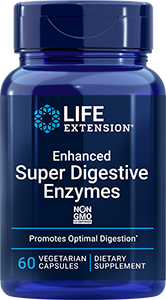
Newsletter
Newsletter
Increased Premature Mortality Risk Associated with Calcium Channel Blockers Not Found Among Those Who Used B Vitamins

Many doctors prescribe calcium channel blocker drugs to treat high blood pressure and various types of heart disease—but research has shown that this medication is linked with an increased risk of elevated homocysteine and a higher risk of premature mortality. Homocysteine is an amino acid made in the body that, when elevated, has been associated with an increased risk of cardiovascular disease, and certain B vitamins lower homocysteine levels.
A recent study, published in the July 2023 issue of the American Journal of Clinical Nutrition, found that patients with suspected stable angina pectoris (cardiac chest pain) who used B vitamins along with calcium channel blockers experienced no increased risk of premature death.1
In this study population, calcium channel blocker users who did not complement drug treatment with B vitamins had an adjusted 69% greater risk of cardiovascular death, a 41% higher risk of noncardiovascular death and a 54% higher risk of total mortality during a median 10.3-year follow-up compared to individuals whose cardiac chest pain was not treated with calcium channel blockers. Among those who did take B vitamins along with calcium channel blocker medications, there was no significant association of calcium channel blockers with cardiovascular, noncardiovascular or total deaths.
“The B-vitamins folic acid, vitamin B12 and B6 are water-soluble nutrients essential for diverse physiological processes, including homocysteine metabolism,” Indu Dhar and colleagues explained. “Notably, calcium channel blocker treatment has been associated with increased systemic homocysteine levels.”
The study included 3,991 individuals who underwent coronary angiography during 2000 to 2004 for suspected stable angina pectoris, which is chest pain that occurs during exertion that can be a symptom of cardiovascular disease. Among this group, 2,573 were enrolled in a trial in which they were receiving one of the following until the end of 2006: a placebo; folic acid, vitamin B12 and vitamin B6; folic acid plus vitamin B12; or vitamin B6. During a median 10.3 years of follow-up, 356 of the people in the current study died from cardiovascular causes and 466 died from non-cardiovascular causes.Products
Apply What You’ve Learned: Homocysteine
- Homocysteine is an amino acid that is made in the body from methionine, an amino acid present in protein-containing foods.
- While homocysteine plays an important role in metabolism, serum levels of homocysteine that are too high have been found more frequently in people with cardiovascular disease, blood clots, stroke and other conditions and diseases.2
- Serum homocysteine levels should be measured regularly to make sure they are within a healthy range. An ideal homocysteine level is less than 8 µmol/L.
- The B vitamins folate, vitamin B6 and vitamin B12 help support healthy homocysteine levels.2
- The nutrient known as betaine (TMG) can remethylate homocysteine into the amino acid methionine. Like B vitamins, betaine may help support healthy homocysteine levels.3
References
- Dhar I et al. Am J Clin Nutr. 2023 Jul;118(1):77-84.
- Pizzorno J. Integr Med (Encinitas). 2014 Aug;13(4):8-14.
- Steenge GR et al. J Nutr. 2003 May;133(5):1291-5.
Featured Life Extension Magazine® Article
Anti-Cancer and Cognitive Effects of Beta-Blocker Drugs
By Edward R. Rosick, DO, MPH, DABIHM
Beta-blocker drugs are often prescribed to individuals with high blood pressure, heart failure, history of heart attack, angina, abnormal heart rhythm, essential tremor and migraine. Beta-blockers inhibit cell receptors for epinephrine and norepinephrine (otherwise known as adrenaline and noradrenaline). Since these hormones can have a stimulatory effect on cancer cells, blocking their receptors may help reduce cancer growth and metastasis. Studies have found benefits associated with the use of beta-blockers in several different types of cancer.
Beta-blockers also help protect the brain from the damaging effects of high blood pressure and inflammation. A lower risk of cognitive impairment or Alzheimer’s disease has been revealed among people who use beta-blocker drugs in comparison with no blood pressure medication.
Read Full Article
What's Hot
Health Concern
B Vitamins Could Help Prevent Advanced Fatty Liver Disease
A report that appeared on July 8, 2022, in the Journal of Hepatology described how folic acid and vitamin B12 could reduce the progression of nonalcoholic fatty liver disease (NAFLD) to nonalcoholic steatohepatitis (NASH).
Related Life Extension Magazine® Articles
Integrating B Vitamins with Calcium Channel Blockers
Calcium channel blockers, a treatment for high blood pressure, may lead to elevated homocysteine levels. Learn how to protect yourself.

Overlooked Risks of Elevated Homocysteine
High homocysteine blood levels contribute to cerebrovascular disease, brain aging, and hearing loss. A simple blood test and specific B vitamins can safely lower homocysteine.
Life Extension Magazine® Issue Now Online
A remarkable number of healthy-longevity findings have been published over the past 18 months.






